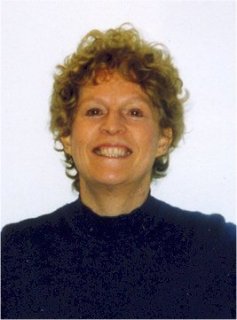AUSTRALIAN POETS AT WORK SERIES 1
Jan Owen
Selected by Coral Hull

[Above] Photo of Jan Owen by Hrafnhildur Ragnarsdottir, 2001.
CH: What kind of working environment best suits you?
JO: I like to have solitude and silence - or soft music - in a light room with a desk facing a window and trees and bushes visited by honeyeaters and finches. My beach place is on a dirt road opposite a large scrub reserve. But I am about to rent an inner-suburban upstairs room also facing trees, which I love, but close to shops, cinemas, cafes and people. The thinking side of my work, the sparking of ideas, can happen when I'm walking, travelling, reading, listening, lying in the bath. Poetry, coffee, deadlines, long interstate phone calls to friends, Jacques Brel CD's and dark chocolate are part of the process.
CH: Do you believe in life after death?
JO: Yes and no. I don't believe in pinning too much on belief. I would like to have more distance from my opinions and doubts - grasping at the future is as distracting as clinging to the past and I lose too much time doing both. Thinking in the language of a further dimension is beyond me - can a square hope to be a cube? And would I want the narrow, negative, petty sides of my ego to 'survive'? I've had occasional intuitions of a pattern of becoming and I find many of the mystical ideas of the great religions resonate with that. 'See the world as yourself, then you can care for all things. 'I'm working on waking to the here and now. In the meantime I'll trust the domestic economy of this universe!
CH: If you had three wishes, what would they be?
JO: Obviously I'd wish for as much as I could cram in for everybody and everything: say peace-justice-happiness-love for the citizens of earth/ all health to our planet/ and a nice day for the folks in the Pleiades too. But wishes aren't horses - so to speak of intentions might be useful - in my own sphere I aim to increase my will power, smile more, and do no harm.
CH: Talk about when you first fell in love?
JO: I fell for an older man - Titian's Young Englishman with a Glove. Hardly ideal - he was 445, I was 14.
CH: Who are your favourite Australian writers?
JO: There are so many living contemporary writers I admire that it would be invidious even to start a list - I'd lie awake at night remembering omissions. So I will just mention two poets both of whom died in 1995 - Gwen Harwood and Philip Hodgins. I had the good fortune to know them both; for me, their poetry seems part of the possibility of a life after death. Gwen's sparkling wit, her sharp honesty and compassion, her summoning-up of the almost ineffable reaches of music, philosophy and love have become touchstones for me. The integrity, purity of diction, down-to-earth humour and courage of Philip's poetry inspires me.
CH: What makes you happy?
JO: Freedom, change, living in the moment, sensing the connectedness of things, doing what I am afraid to do, escaping my conflicting selves. Also, playing with words; music and dancing; meeting friends; exploring ideas and places; reading and learning - other languages, history, philosophy… everything except Instruction Manuals. Above all, feeling my family is safe and happy. But there is a line of Rilke's that rings true to me - 'Not that happiness really exists, that precipitate profit of imminent loss.' I have learnt more from unhappiness and write from sadness as much as from joy.
CH: What is your gift to the world?
JO: My daughter and my two sons.
CH: What did you want to be when you grew up?
JO: Artist, actress, dancer, poet. Explorer, scientist, photographer, spy.
I ran out of cherry stones. Now, I would like mainly to be grown-up.
| |
This Instant
The Silver Gulls
spaced out,
hunch like poets in the doldrums,
fronting the white noise of ideas
without a breath of word;
a pastel wash of thought
turns froth on the grit.
Twenty red-rimmed chilly stares
wipe out the globe
as if they'd scrawled till 2 am
in a critical zone,
upstaged by all that airy potential,
those hendecasyllables endlessly rolling in.
Leave us at least a sign -
wavery renga
claw-printed through marram grass,
the odd craaark in rant pose.
Silent, on the shore of possibly
nothing they wait
under a sky-blue question
by equivocations of sea.
Ceiling starlings
Get the jitters.
Out on the roof till late,
they tack over emptiness and back,
six pairs of claws
skidding apart on tin -
the Misses Left skating after the Messrs
Right for all the world
like doing eurhythmics to Philip Glass
or reading Timmy Tiptoes in cuneiform.
Oh 'gregarious birds of black and brown
speckled lustrous plumage',
come back in.
The OED says they're Germanic (staraz, staron).
Don't mention Dasein,
Being-in-the-Ceiling is bad enough.
I scuffle straw thoughts in my nesting box
till they settle down,
my live-in vermin birds
named for small stars and loving rhymes.
I wish them prophetic dreams
of distant derelict sheds.
First light they are hedonists again
- PhD, Heidelberg (failed) -
screeching small joy to shreds.
Id Blinks
total eclipse of the sun
over San Lazzaro. Mini travesties
of the monks are hanging out
like black handkerchiefs in the pines.
There are nests in the silence between
the Byzantine and the surreal.
'Nevermore' is wearing away
the pentatonic scale
to sound rings like dying haloes
or shadow quoits over the pole of why.
All the plagiarists here have smoker's throat.
They tenant no fixed space,
always already evicted again,
lift the occult
to vaudeville, standing by in the wings
like hired cloaks for a disappearing act
you can see straight through -
small sardonic souls of wayang lace,
claw raised, screen torn, last twitch.
Quo vadis, Corvus?
This Instant
the honeyeaters' cries pierce light ...
the grevillea spikes are trembling
with flickers of bird
maybe, maybe,
sipping at spider-flowers
head down, grey and yellow.
Even here, gold and its shadow:
at the end of the day
the bees choose mergers;
a butterfly floats
its banner against Monsanto,
orange and black like a dying sun
pushed up against bars.
B sharp, shriek the little birds, B sharp,
the edge of survival tastes of honey.
Listen
two ring-doves hidden in green
obsessively auditing peace.
The Arrival
After the watercolour by Thornton Walker
We are a squat of guavas
arranged to advantage on blue
or plopped in Malacca bowls
(it's a tight squeeze).
'Jade, emerald, malachite, vert,'
we murmur together,
'loden, reseda, celadon, sage' -
our gently differing opinions are always green.
From imminence to immanence
we have come -
having made the long trip
from fruit to art,
we have entered guava heaven.
Evolution was a heavy scene
and we do not intend to budge again.
From our vantage point
we watch the colour of time,
we loll,
comatose as the thighs
of the lumpy old woman
of Bukit Bintang
who fell asleep in a Reject Shop
and was sold for a song.
Aeons and aeons it's been,
from primordial jelly
to a verdigris thought,
and we are exhausted, worn-out, done,
utterly, utterly guava.
The Pangolins
for Mulaika
Throwing the I Ching by the northern wall
(Mountain over Water: the cataract clears),
rereading the dubious message in dubious light,
dusk there is as brief as thirty years.
The dogs were off at the end of the garden, barking
at moonlight or monkeys, tenor and alto and bass.
Under the rambutans it was lighting-up time,
teetering lanterns in the bushes and grass
were practising emerald - becoming, yes, here;
the fireflies above were loopy with desire.
A pounding of fists south-east from the Surau
was the kampong boys on their Thursday drums. The air
yearned after the odd missed beat like a tired heart.
And then the stranger came. Out of the neat
fit of the dark. Self stood back. No-name
trundled up, snuffling the mulch with her slender snout.
She was the presence of many grandmothers, a homebody
buttressing wonder, nosing around the boles
of the clumped bananas; tip to tapering tip,
a relaxed bell curve validated with scales
perfectly graded - 3:5:8:13 ...
Her back was firm terrain under my hand,
an equable riddle with a waddle (Earth
over Earth: a friend will be lost, a friend will be found).
I squatted down. She paused and quirked her head:
this was no tree. To run or not to run?
To amble. With dignified haste like the shopping-bag rush
for the 5 pm to Rawang in Ramadan.
What goes on four legs at night and none at noon?
At dawn alert next day Suwanti chained
the dogs away from a round jungle-green enigma
then bowled the baby into the hedge to its kind.
Fern
The idea of the shadow of a fern
caught in grey shale, a crosier's lean
scepticism, fingerprints on light,
have kept a century arguing half the night,
rifling the long memory of stone
whose finest thinkers filter down
from outer time's thin crust
green hypotheses of leaf and wrist.
Death's emanations they half-understand -
a patterned lack of rock, absent ground,
but only the far-out theorists, sand and loam,
hold being is the horizon of time.
The molten centre seething on and on
shapes solid earth and draws it down again:
a dark relentless will to learn
the idea of the shadow of a fern.
Acknowledgments: Antipodes (USA), Fingerprints on Light (A&R, 1990), Island Magazine (Australia), Meanjin (Australia), PN Review (UK), Quadrant (Australia), Timedancing, (Five Islands Press, 2002). |
About the Poet Jan Owen

|
Jan Owen is a South Australian who studied Arts and librarianship and has worked in university and college libraries. She now teaches creative writing from time to time and from place to place, most recently at the 2003 Wollongong Workshops. She has received several
Arts SA grants including the Barbara Hanrahan fellowship for 2000 and several Literature Board grants including a current two-year Fellowship. Residencies have taken her to Tasmania, Rome, Malaysia and Paris and she has spoken at national and overseas conferences and festivals. She has read her work and a range of other Australian poetry in Italy, Yugoslavia, Hungary, France and the UK and has affectionate memories of Adelaide's Friendly Street poetry readings in the eighties. Awards include: the Jessie Litchfield Prize, the Harri Jones Memorial Prize, the Anne Elder Award, the Mary Gilmore Prize, the Wesley Michel Wright Poetry Prize and the Gwen Harwood Poetry Prize. Her work has been widely anthologized and one of her poems will appear in OUP's forthcoming edition of Seven Centuries of Poetry in English, edited by John Leonard. |
[Above] Photo of Jan Owen by Hrafnhildur Ragnarsdottir, 2001.
I Next I
Back I
Exit I
Thylazine No.3 (March, 2001) |



